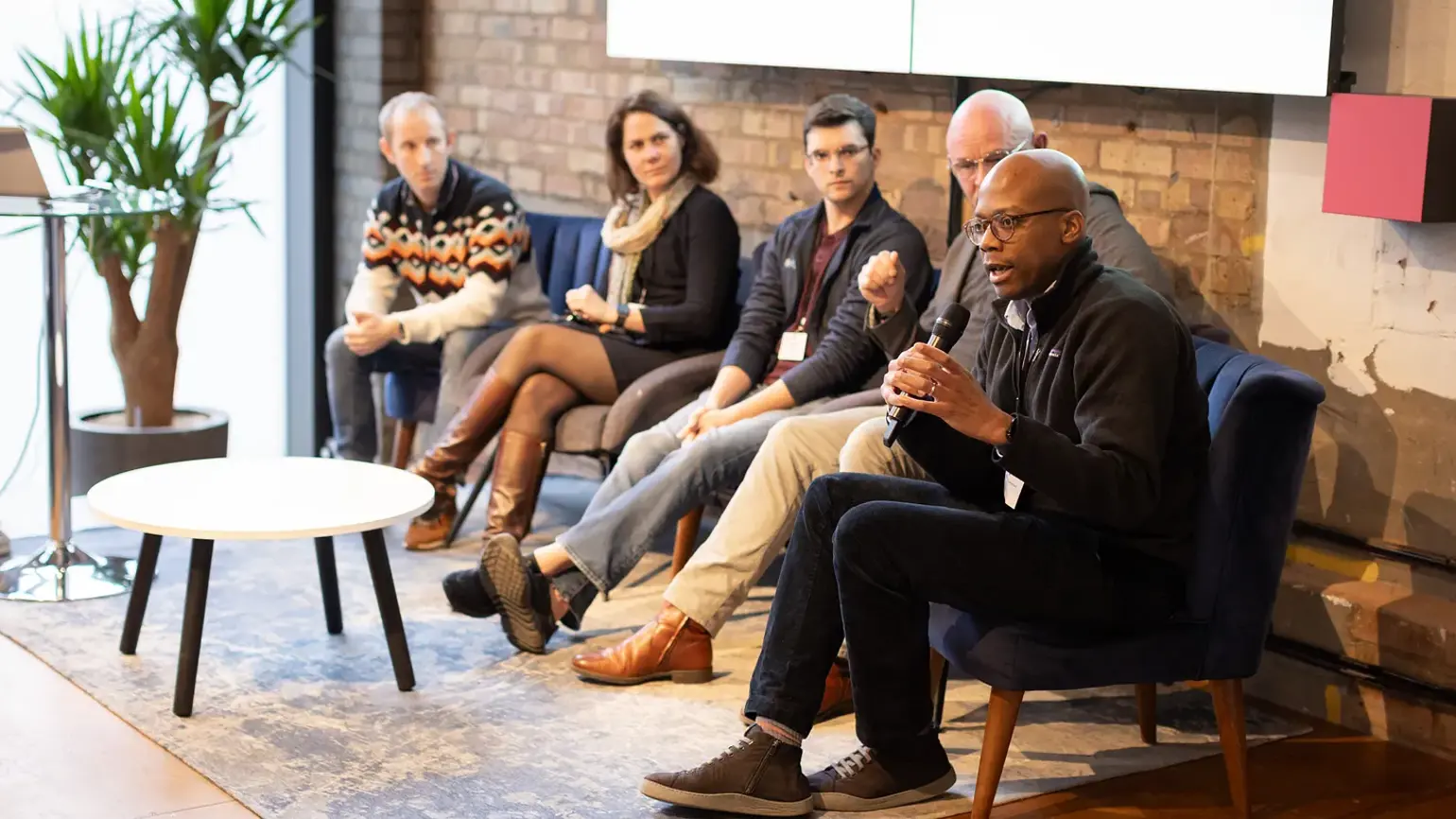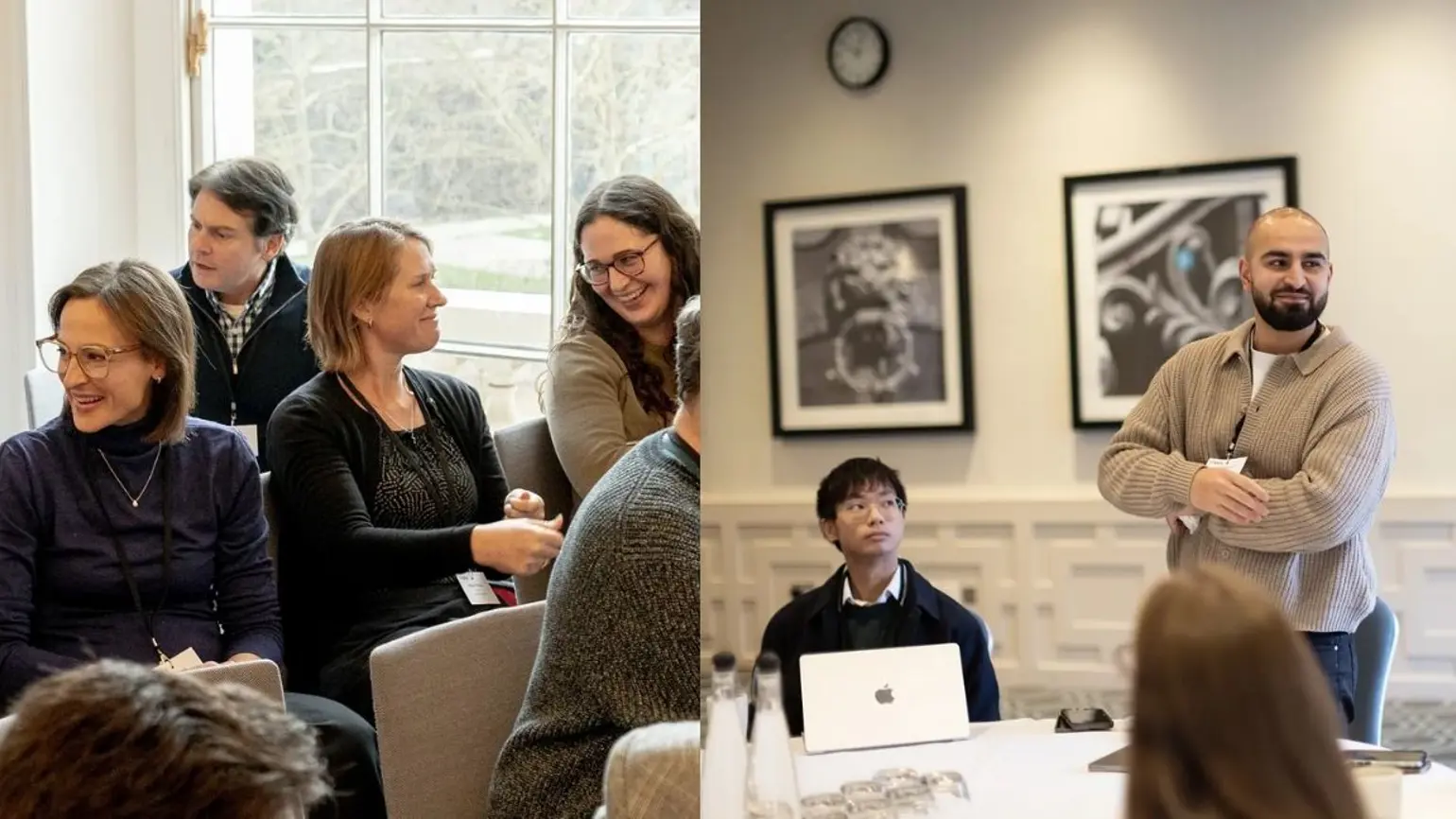6 March 2025
Discovery, connection, creation: inside our workshops
How we refine ideas, forge new collaborations, and unite around goals in our workshops.

"Raise your hand if you know half the people in this room." Of thirty people, a single hand goes up. "How about if you know fewer than seven people?" Almost every hand shoots up.
This scene at an ARIA workshop on Programmable Plants didn’t happen by chance. “Our workshops are deliberately designed to unlock the siloes in science and bring together experts who wouldn’t otherwise meet,” explains Muji Ahmedi, Product Operations Lead. As part of ARIA’s Product team, he develops the operational mechanisms that enable our PDs to drive scientific and technological breakthroughs – including designing these workshops. “The sparks fly when workshop participants realise how much their work interrelates, and that’s where the real innovation happens.”
Breakthroughs often come from unexpected interactions – Tim Berners-Lee, a computer scientist, built the Web at CERN, to meet the collaboration needs of the particle physics community. Watson and Crick uncovered DNA’s double-helix structure, building on Rosalind Franklin’s crucial X-ray diffraction data. Karikó and Weissman unlocked mRNA’s potential by bridging biochemistry and immunology. Too often, these moments happen unpredictably. At ARIA, we’re designing for them.
Our workshops play a key role – breaking down siloes, forging connections, and unlocking new ideas that wouldn’t emerge in isolation.
We run two distinct types of workshops: discovery workshops that shape initial programme theses, and Creator workshops that forge connections between funded teams and align projects towards the bold goals.
“[The workshop] genuinely strengthened the programme.”
Discovery workshops serve as crucial testing grounds for refining ideas and assessing what is critical for a programme. For Programme Director Jenny Read, this was a pivotal moment.
“The in-person workshop was the most stressful part of the programme development process,” she reflects. “I’d published my programme thesis and was now asking 200 people to challenge it. I worried whether it was compelling enough to justify their time – but in the end, it was energising. It brought together many future applicants and genuinely strengthened the programme.”
Following visits to robotics hubs around the UK and insights from this workshop, Jenny placed greater emphasis on integrating hardware and software – a shift that became the foundation of the Robot Dexterity programme as a whole.

Creator workshops, meanwhile, offer a chance to build connections and community among ARIA funded teams and align diverse projects towards common goals. Take Scaling Compute: its teams are all working toward one ambitious goal – reducing the hardware costs required to train large AI models by over 1000x. As DeepSeek’s advances showed that the field was evolving even faster than expected, the Programme team and Creators came together to evaluate the programme’s goalposts. ARIA is now onboarding a team to track these moving targets and publish findings to the research community.
“Once people are in a room together you see commonalities and shared challenges that you wouldn't initially expect.”
Even ARIA’s opportunity seed teams – who work more independently – experience this dynamic. When the Scoping Our Planet seed teams met in Oxford, a common thread quickly emerged. “We're funding a really diverse group of projects within the opportunity space, and once people are in a room together you see commonalities and shared challenges that you wouldn't initially expect,” said Dan Giles, Technical Specialist. “It was really exciting to see.”
Workshops don't just introduce people, they create the conditions for entirely new outcomes to emerge.
In one case, the six teams working on Technical Area 3 of our Precision Neurotechnologies programme agreed to co-author a white paper on the future implementation of neurotech in clinical practice. The idea was sparked by hearing the different aspects of each other’s work at the recent programme workshop, where they’d met for the first time.
Or take Stefano Gogioso and Mirco Giacobbe, who met at a Safeguarded AI workshop. That meeting didn’t just spark an idea – it sparked a brand new project, 'Hyper-optimised Tensor Contraction for Neural Networks Verification', which is now ARIA-funded.
"Having the right people in the right room will always lead to something interesting. But creating a shared identity and mission amplifies their impact," explains Muji. “We’re not just funding research; we’re funding a community.”
